**Title: Comprehensive Guide to Medical Billing Info**
**Introduction:**
Medical billing is a crucial aspect of the healthcare industry that ensures healthcare providers get paid for the services they provide to patients. Understanding the ins and outs of medical billing is essential for both healthcare professionals and patients. In this comprehensive guide, we will explore everything you need to know about medical billing, from the basics to more advanced concepts.
**What is Medical Billing?**
Medical billing is the process of submitting and following up on claims with health insurance companies in order to receive payment for services rendered by healthcare providers. It involves translating medical services into billing codes that are recognized by insurance companies to facilitate reimbursement.
**Key Terms in Medical Billing:**
- CPT Codes: Current Procedural Terminology codes are used to describe medical procedures and services performed by healthcare providers.
– ICD-10 Codes: International Classification of Diseases, Tenth Revision codes are used to classify diseases, injuries, and symptoms for medical billing and coding purposes.
– Health Insurance Portability and Accountability Act (HIPAA): Legislation that protects patients’ medical information and privacy.
– Explanation of Benefits (EOB): A statement from health insurance companies that explains how a claim was processed and outlines the patient’s financial responsibility.
**Benefits of Effective Medical Billing:**
– Ensures accurate and timely reimbursement for healthcare services.
– Reduces claim denials and rejections, leading to increased revenue.
– Improves patient satisfaction by providing transparent billing information.
**Practical Tips for Effective Medical Billing:**
1. Verify patient insurance coverage before providing services.
2. Use electronic billing systems to streamline the billing process.
3. Submit claims promptly to avoid delays in reimbursement.
4. Stay up-to-date on billing and coding guidelines to prevent errors.
**Case Study:**
Dr. Smith’s medical practice implemented a new electronic billing system, resulting in a 20% decrease in claim denials and a 15% increase in revenue within six months. The practice saw improved efficiency and accuracy in billing processes, leading to higher patient satisfaction.
**First-hand Experience:**
As a medical billing specialist, I have witnessed the impact of efficient billing practices on healthcare providers and patients. By staying informed about the latest billing regulations and employing best practices, healthcare organizations can optimize their revenue cycle and provide better care to patients.
**Conclusion:**
Medical billing plays a vital role in the healthcare industry, ensuring that healthcare providers receive timely reimbursement for their services. By understanding key terms, following best practices, and leveraging technology, healthcare organizations can improve their billing processes and enhance patient satisfaction. Stay informed, stay compliant, and stay successful in medical billing.



